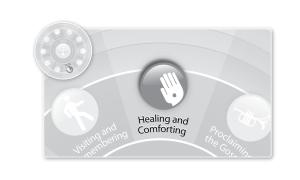 I can recall even as a young kid in the Methodist Church being puzzled and mildly amused by the confession liturgy the congregation would drone through every week. In my eight year old sensibilities it loosely came across like this:
I can recall even as a young kid in the Methodist Church being puzzled and mildly amused by the confession liturgy the congregation would drone through every week. In my eight year old sensibilities it loosely came across like this:
Whole Entire Congregation drones: “We have done a lousy job again this week, Lord.”
Lay Leader: “It’s OK. God isn’t upset about it. Try to do better next week.”
The Whole Entire Congregation didn’t really sound terribly troubled about having done a lousy job, and the Lay Leader didn’t sound altogether excited that God was willing to let the week’s bygones be bygones. So the whole ritual puzzled me and seemed rather ineffective and ineffectual.
Sadly, as I grew up and away from my liberal church upbringing and into an evangelical heritage, I saw that many evangelical Protestants having encountered the same thing, dealt with it by discarding not only the droning liturgy but the practice of confession itself.
I think we evangelical Protestants have not even the slightest clue how much that discarding would have shocked the Protestant reformers and broken their hearts. Luther, for example, who held that the whole Christian life was an embodiment of repentance, believed fervently that the Christian should participate in three types of confession:
- Confession to one’s pastor
- Private confession to God
- Confession to the church
He was passionate, of course, to make certain Christians knew that in confessing to their pastor it was not the pastor who forgave sins but God, and that the pastor’s role was one of soul care or midwife.
Already in his time, however, Christians were beginning to toss confession overboard. Fast forward half a millenium later and what remains is confession flotsam–general confession liturgies in mainline Protestant churches, and comprehensive absolution without any confession in evangelical circles.
Enter Randy Asburry’s awesome post, Comfort From Anonymous Confession? Essence: This is not hard to figure, people. Healing and comfort become real when confession (to God and regularly in the presence of others who can hold us accountable) is specific and followed by absolution (pronounced by real live people in person), which is the gospel proclamation of the forgiveness of sins. Asburry is especially troubled by the notion of Internet confession or salacious anonymous tell-alls:
I also puzzle over the misguided notion that merely confessing sins–whether online behind the anonymity of a user name and password, or writing them on a piece of paper and throwing it into the fire, etc., etc.–is enough. That seems too much like feeling sick, having the symptoms of the flu, and merely saying to myself, “I have the flu.” Merely getting to that point still hasn’t given me the true healing and restored health that I need!
Only the Absolution can do that, where sins are concerned. Absolution is the real medicine, the real “stress reliever.” Here’s how the Apology of the Augsburg Confession says it: “We also keep confession, especially because of absolution, which is the Word of God that the power of the keys proclaims to individuals by divine authority” (Apology XII:99, emphasis added).
So to summarize:
- Confession: Specific. Offered to God. In the presence of accountability partners.
- Absolution: Gospel rooted. Glued to confession. Like day following night.
No droning, no generalities, no anonymity. That medicine has expired and should be tossed from the cabinet.
And the medicine we previously tossed from the cabinet due to personal discomfort is the one we desperately need to bring back.










